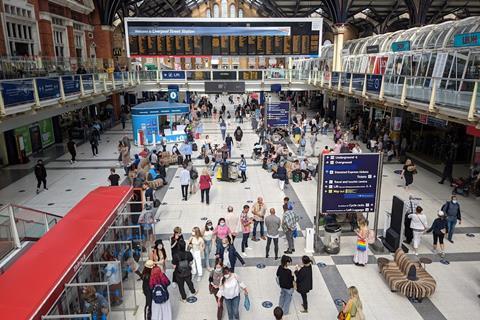
UK: The rail industry has responded to RMT union members’ vote in favour of strike action across Network Rail and a number of train operating companies.
Announcing the ballot result on May 24, RMT said 71% of the more than 40 000 members who were balloted had voted, with 89% of those in favour of strike action and 11% against.
The union is now demanding urgent talks with Network Rail and the train operating companies to try and find a negotiated settlement to the dispute, which it said was focused on pay, jobs and safety.
| RMT strike ballot |
|---|
| Voted for strike action and action short of strike |
| Network Rail |
| Avanti West Coast |
| c2c |
| Chiltern Railways |
| CrossCountry |
| East Midlands Railway |
| Great Western Railway |
| Greater Anglia |
| LNER |
| Northern |
| South Western Railway |
| Southeastern |
| TransPennine Express |
| West Midlands Trains |
| Voted for action short of strike |
| Govia Thameslink Railway |
‘Today’s overwhelming endorsement by railway workers is a vindication of the union’s approach and sends a clear message that members want a decent pay rise, job security and no compulsory redundancies’, said RMT General Secretary Mick Lynch.
‘Our NEC will now meet to discuss a timetable for strike action from mid-June, but we sincerely hope ministers will encourage the employers to return to the negotiating table and hammer out a reasonable settlement.’
Responses
Responding to the vote, Network Rail CEO Andrew Haines said ‘the RMT has jumped the gun here as everyone loses if there’s a strike’.
Network Rail said it had not yet tabled any formal proposals for change, but was still discussing ideas, and would welcome ‘constructive dialogue’ with the unions as it develops formal plans. It estimated that strike action would cost Network Rail around £30m a day.
‘We know our people are concerned about job security and pay’, said Haines. ‘As a public body we have been working on offering a pay increase that taxpayers can afford, and we continue to discuss this with our trades unions. We urge the RMT to sit down with us and continue to talk, not walk, so that we can find a compromise and avoid damaging industrial action.
‘We are at a key point in the railway’s recovery from the pandemic. The taxpayer has provided the industry with £16bn worth of additional life support over the last two years and that cannot continue.
‘Travel habits have changed forever and the railway has to change as well to adapt to this new reality.’
Rail Delivery Group Chair Steve Montgomery said the railways needed to adapt to attract passengers back and reduce running costs. ‘We urge the RMT leadership to behave responsibly, and to talk to us to find a way to avoid damaging industrial action and secure the long-term future of the industry’, he said.
RDG cited rest day working as something it believes needs to change.
‘We have to change our ways of working and improve productivity to help pay our own way’, said Montgomery. ‘The alternatives of asking taxpayers to shoulder the burden after government has contributed over £16bn to the industry during Covid or asking passengers to pay even higher fares when they too are feeling the pinch, simply isn’t fair.’
Maggie Simpson, Director General of the Rail Freight Group, said ‘any strike action risks severe disruption to the economy if key freight services cannot run. We urge government, Network Rail and the unions to act swiftly to find a solution to this damaging dispute.’
Simpson said RFG members had been working with Network Rail to develop contingency arrangements, but it would be impossible to run all freight services during a strike and there could still be significant disruption.
General Secretary of the TSSA union Manuel Cortes said the ‘historic’ ballot result ‘clearly shows the strength of feeling among rail workers’. TSSA is also in dispute with Network Rail and train operating companies covered by the Department for Transport over pay, job security and conditions.
Clive Wratten, CEO of the Business Travel Association, said ‘business travel has been ravaged by the effects of the pandemic. To strike at such a critical time for the industry will shatter hopes of recovery for many businesses. We sympathise with the necessity for job security, but the industry must work together as a whole, instead of prioritising the needs of one group over another.’



